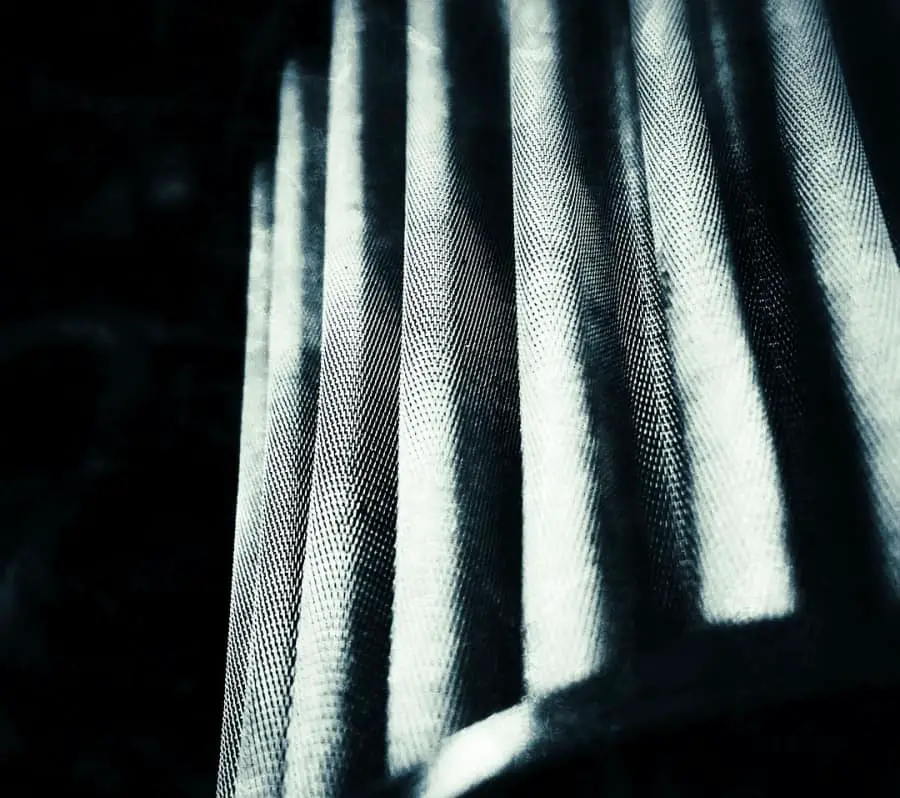The air filter is an essential part of most lawnmowers on the market today. It plays an effective role in facilitating optimum performance and overall engine longevity. Of course, like most parts on a machine, maintenance is key.
Most mower air filters should be changed no later than 300 mowing hours. A common practice is to check the filter at every 50 mowing hours and to be prepared to replace it starting at 100 mowing hours. These are general rules for most mower filters, but visual checks will be the final determiner.
Today we zoom in on a key aspect of lawnmower maintenance: management of the air filter. In the following article, we will take a look at how often the air filter should be changed, as well as how to inspect it if you suspect problems. We also discuss the possibility of cleaning the filter, as well as the best ways of doing so. Let’s get started.

Contents
How Long Does A Lawn Mower Air Filter Last?
The air filter on a lawnmower is literally responsible for filtering the air that comes into the engine. This prevents dust, mud, grass clippings, and other debris from getting into the engine and wreaking havoc. In a nutshell, the air filter enables dirt-free air to come into the engine for cooling and oxygen necessary for the combustion process.
The general milestone for changing air filters is 300 hours of operation. The frequency of air filter changes depends primarily on how much the mower is used. There should be regular monthly to seasonal inspections to make sure the integrity of the filter is still good.
The air filter cannot perform this role forever. Eventually, it will need to be inspected, cleaned, or changed.
However, many owners prefer to change the air filter with every service which may be much earlier than 300 hours. Service for most walk-behind mowers is usually carried out at 50 hours, while most riding mowers are serviced at 100 hours.
We also recommend that you at least inspect your air filter at the start of every new mowing season, especially if you store your mower for extended periods during the winter. Dust can easily accumulate on the air filter during storage, especially if the mower isn’t covered with a tarp.
How Do You Check A Mower Air Filter?
If you, like most people, don’t really keep track of your mower’s usage hours, you may get to a point where the machine may start to develop “symptoms” of a clogged air filter. Maybe the mower doesn’t run as smoothly as it used to, or maybe it doesn’t start up at all. Perhaps you’ve just noticed that the mower is particularly dusty.
Whatever the case, you will have to take a closer look at the air filter.
To check a mower air filter a visual inspection can show debris or discoloration. Most mower air filters are located right next to the engine, usually under a panel. For a riding mower, you have to look under the hood to access this cover panel. Some panels may have a screw holding them in place.
Be sure to know you engine and take precautions against accidents.
Safety Precautions When Checking Your Mower’s Air Filter
But a word of warning though, you must disconnect the sparkplug before inspecting or working on a lawnmower. Disconnect the sparkplug lead and ensure it’s tucked away safely and away from the plug to prevent the mower from starting accidentally. The last thing you want is to lose a finger.
Another safety precaution is to avoid opening up the mower or touching the engine right after operation. You should give the machine sufficient time to cool off.
The air filter is usually on the other side of the panel. You must pull the filter from the panel and inspect for dirt, debris, and discoloration.
Know What The Filter Is Supposed To Look Like
We recommend that you have an established idea of what a fresh air filter looks like, so you can determine the proper state of your current one. For example, if an air filter that is supposed to be white has changed to a dark brown or black color, it’s a tell-tale sign that a change is needed.
The discoloration is a result of all the dirt and debris the mower has sucked up since it was purchased (or since the last air filter change). Oftentimes, the holder and even the airflow hole leading to the carburetor will also be dirty if the filter hasn’t been changed in a while.
One way to familiarize yourself with how new and clean filters are supposed to look is to check the popular ones out on Amazon.
Here are some links to common and popular mower air filters on Amazon…
- Briggs and Stratton Air Cleaner Cartridge Filter
- Harbot Flat Air Filter Cartridge
- HOODELL 5 Pack Air Filter
- HEYZLASS 2 Pack Air Filter
If you like this article, you may also like…
- What To Know About A Lawn Mower Running Slow And Rough
- Lawn Mower Blown Head Gasket Symptoms (Experts Explain)
- Lawn Mower Bogging Down Or Not At Full Power? (Solved)
Can A Mower’s Air Filter Be Cleaned Instead Of Replaced?
First off, we recommend that you look to change your air filter when it goes bad. A new air filter has structural integrity and is completely fresh.
It is possible and advisable to clean debris and particles from your mower’s newer air filters on a regular basis. It is as easy as hand picking out the material or blowing out the foreign pieces. Once the filter has started to age it can still be done, but the performance of the mower may suffer.
If you are unable to access a new filter, your next best option is to clean your old one, provided it is not too dirty. It is not worth your time to try to clean an excessively filthy air filter.
How To Clean A Lawn Mower Air Filter
If you’ve decided to clean rather than replace, there are a few key steps for you to follow. For the best results, we recommend that you make use of liquid dish detergent, a washbasin or bucket, a rinsing tap or hose, a clean dry rag, and safety gloves.
Again, ensure that you observe the safety precautions we discussed earlier.
After uncovering the air filter panel, there are various approaches to cleaning that depend on the material the filter is made from.
- Paper air filters are quite delicate and cannot be washed or scrubbed excessively. The best you can do is to shake the filter to dislodge any loose dirt. Hold the filter up to a lightbulb to test if it blocks the light. If it does, you will have to change it.
- Foam filters may be cleaned if they are not excessively stained and discolored. Add the detergent to the water in your bucket and scrub the filter thoroughly to get rid of dirt and grease. The filter must then be rinsed before you dry it with a clean rag.
- Foam filters must also be oiled slightly to allow air to slick through. Rub the oil into your hands, as you would with lotion, before gently rubbing it onto the filter’s surface.
- You also have hybrid filters but these typically come with instructions on how to clean them.
After cleaning the filter, you must also clean its covering panel and holder. The holder must be cleaned with a damp cloth. If your mower has a choke, engage it to close the butterfly valve in the airflow hole. Closing this valve minimizes the risk of you pushing dirt towards the carburetor,
Can Lawn Mower Filters Be Washed?
This depends on the material the filter is made from.
Paper filters cannot be washed at all. They must be replaced.
The foam components on a hybrid filter may be washed but this is subject to the manufacturer’s instructions. Hybrid filters may have parts that shouldn’t get wet.
As we’ve seen above, foam filters can be washed.
Washing a filter should not take the place of installing new ones when the old one has become discolored and worn. Clean filters with water should be done with care, or a new one will be needed anyway.
The Final Touches On Changing A Mower Air Filter…
The air filter is a small part that is made of light material, but it plays a very important role in your mower’s operation. Check it often and keep it clean and a mower do a much better job.
If this bit of maintenance is neglected, mowers can begin to run rough or lose power. It is a simple visual check and one that anyone can easily do.
If you would like to know other reasons that mowers can have problems, see my articles…
- What To Know About A Lawn Mower Running Slow And Rough
- Lawn Mower Blown Head Gasket Symptoms (Experts Explain)
- Lawn Mower Bogging Down Or Not At Full Power? (Solved)
References
https://www.thespruce.com/lawn-mower-maintenance-cleaning-air-filter-2153063
https://www.youtube.com/watch?v=rmTdGNRtRVg&ab_channel=pete%27stools
